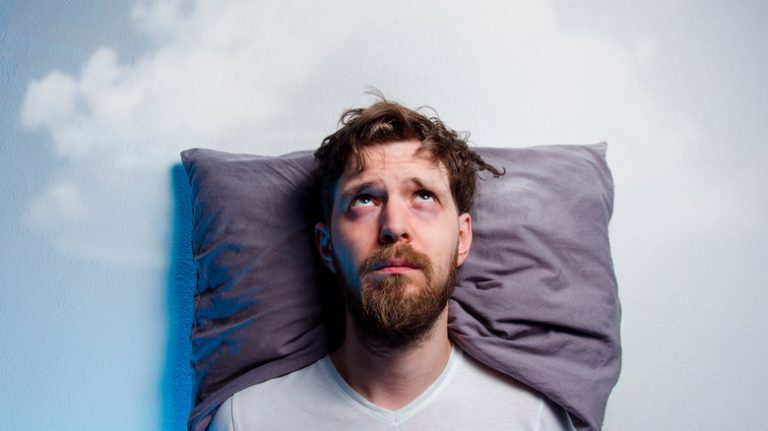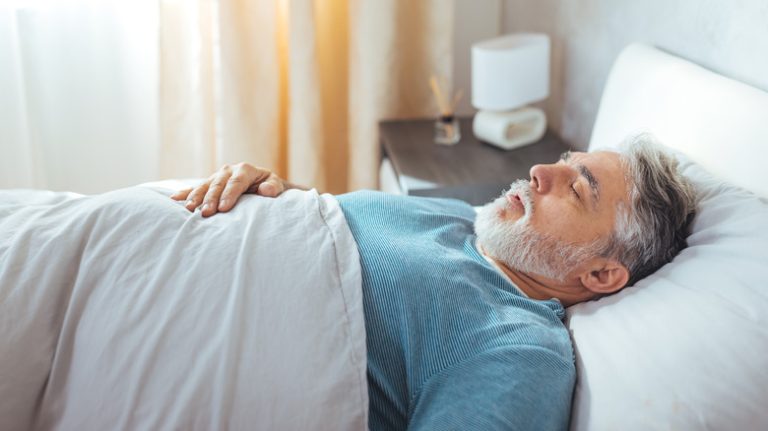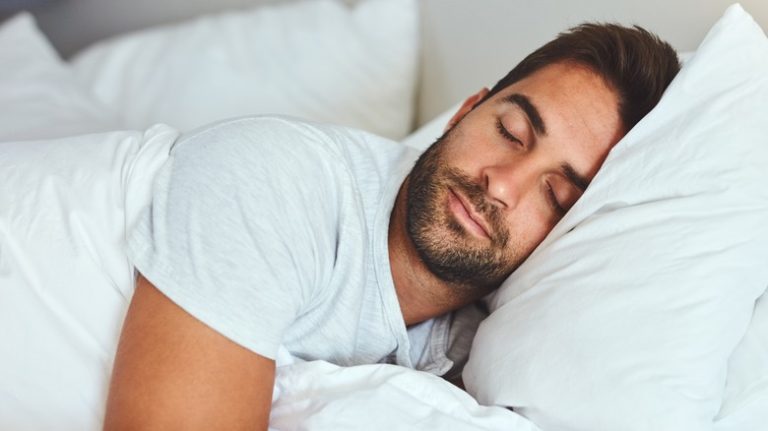Our physical health and our emotional health are not independent of one another. This is particularly true when it comes to sleep, explains Dr. Julia Kogan, PsyD, health psychologist, and sleep and stress/anxiety specialist in an exclusive interview with Health Digest. Sharing what initially drew her to this line of work, Dr. Kogan states, “In my work as a health psychologist in primary care clinics, I was fascinated by the referrals I received for unexplained medical issues and other concerns. These concerns were often related to high stress, anxiety, and poor sleep.”
With a special interest in the relationship between stress and quality of sleep, Dr. Kogan points out just how many people across the country struggle with getting a healthy amount of rest on a nightly basis. “It is estimated that up to 30% of American adults suffer from insomnia, and up to 50% experience some kind of sleep issue,” she states. Such statistics lend further evidence to research published by the U.S. Centers for Disease Control and Prevention (CDC) citing that 1 in 3 adults are not getting the recommended seven or more hours of sleep per night. “Unfortunately, many people do not realize that sleep is absolutely something that can be improved, which results in them suffering silently,” says Dr. Kogan.
Having seen improvements in her patients in a relatively short amount of time, Dr. Kogan has witnessed firsthand how deeply intertwined sleep is with overall well-being, productivity, and life satisfaction.
Prepare your body and mind for a good night of sleep
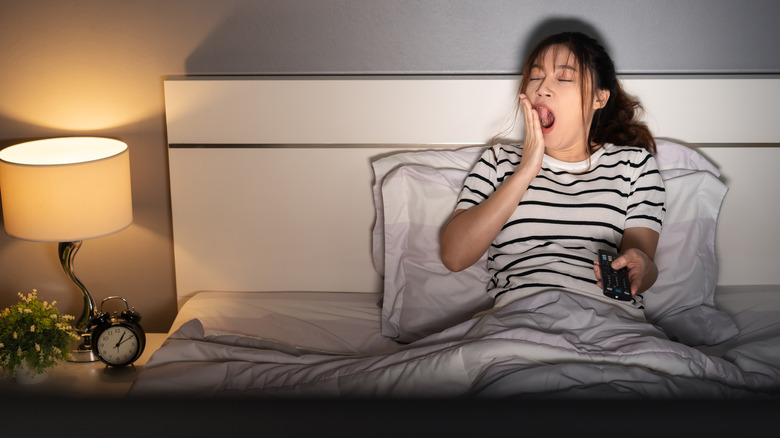
When it comes to bettering our quality of sleep, it’s important to first figure out what’s getting in the way. Dr. Kogan identifies a number of factors that can negatively influence our sleep including a lack of physical activity, caffeine or alcohol consumption, an irregular sleep schedule, taking long naps, high levels of stress, as well as various sleep or mental health conditions.
It’s also important to note that how we relate to our sleep environment can play a large role in our quality of rest. “One of the biggest culprits for poor sleep is using the bed for non-sleep related activities such as working, watching television, tossing and turning for many hours, thinking, and other activities that are not sleeping,” Dr. Kogan explains. “Many people have conditioned insomnia, which is where the mind associates the bed or bedroom with a place of non-sleep, making it difficult to fall and stay asleep.”
Additionally, of the many factors that can interfere with sleep, Dr. Kogan reports sleep apnea to be the most common. “Sleep apnea is a sleep disorder in which individuals stop breathing at night. This is highly underdiagnosed and many people have sleep apnea without knowing it,” she states. “When someone has sleep apnea, they get very little deep sleep because the body constantly wakes them up so they do not stop breathing.” Often characterized by loud snoring, gasping for air, and daytime drowsiness, Dr. Kogan states, “Addressing untreated sleep apnea is one of the best ways to improve sleep quality and deep sleep.”
Reconsider your supplement routine

For those who struggle with sleep, some have found relief in the use of supplements. Purported to have a host of sleep-boosting benefits, popular supplements such as melatonin, valerian root, magnesium, and glycine are thought to help promote relaxation or support the body’s natural circadian rhythm (per Healthline). However, Dr. Kogan generally advises against the use of supplements without prior consultation from a doctor, as some supplements can have the opposite desired effect on sleep. “Certain supplements can be stimulating, such as maca root, Vitamin D, B vitamins, multivitamins (can contain caffeine, green tea extract), and other supplements, making it hard to sleep depending on sensitivity and timing of intake.”
In addition, Dr. Kogan points out that over-the-counter supplements could potentially interact with prescription medications and produce unwanted side effects. “Therefore, I always recommend that people consult with their primary care doctor before adding in supplements,” she states. “If people are eating well and following other best sleep practices, supplements should not be needed to improve sleep.”
Opt for well-balanced dinners earlier in the evening

Diego Cervo/Shutterstock
Dr. Kogan explains that the contents of our plate can affect our quality of sleep long after we put our fork down. While certain foods can set us up for success come bedtime, others can work against us. “Eating well-balanced meals that include protein, carbs, and fat is the best way to support overall health and sleep,” states Dr. Kogan. “Balancing meal plates with ½ vegetables, ¼ protein source, and ¼ complex carbohydrate source, as well as fruits, is a great way to stabilize blood sugars which can be helpful for falling asleep at night. A balanced plate also will provide adequate vitamins and nutrients that can help promote sleep.” On the flip side, however, Dr. Kogan explains that foods that are high in sugar and saturated fat and low in fiber have been linked to poorer quality of sleep.
Leaving a solid window of time between your last meal and bedtime can help prime us for optimal sleep. “Timing of meals is important, since eating a heavy meal within 2 to 3 hours of sleeping can make it hard to sleep well since the body is still digesting,” according to Dr. Kogan. She cautions, however, that going to bed on an empty stomach can have the same negative effect. “If someone is feeling very hungry right before bed, eating a light snack such as a string cheese, apple, or small bowl of cereal can be helpful.”
Practice calming techniques to ease anxiety

ViDI Studio/Shutterstock
Because stress can stand in the way of sleep, Dr. Kogan suggests a few different practices to help keep anxiety levels low before bed. One such practice is activating the body’s calming response. “I recommend setting a buffer zone or relaxation zone 30 to 60 minutes before a desired bedtime if possible,” instructs Dr. Kogan. “This should be a time where devices are powered off, work is put away, and individuals are focused on relaxing and engaging the deep relaxation response. Deep breathing and progressive muscle relaxation specifically are great strategies that are useful for not only calming anxiety, but helping with sleep.”
Alternatively, Dr. Kogan suggests that journaling can also be helpful for coping with anxiety. “A helpful strategy for dealing with high stress and anxiety is an exercise called externalizing worries. This involves setting aside 15 to 20 minutes where individuals write out any worrisome thoughts with their plan to address it. This helps get the thoughts out of their mind so when they are trying to fall asleep, these thoughts are not troubling them.” However, Dr. Kogan emphasizes that the timing of this practice is important and should be avoided right before bed.
All in all, Dr. Kogan explains that it’s important to associate our bed with sleep rather than stress. Therefore, if you find yourself experiencing anxiety while trying to fall asleep, she suggests getting out of bed and continuing to engage in relaxation exercises before returning to bed.
Be aware of the signs your body is in need of rest
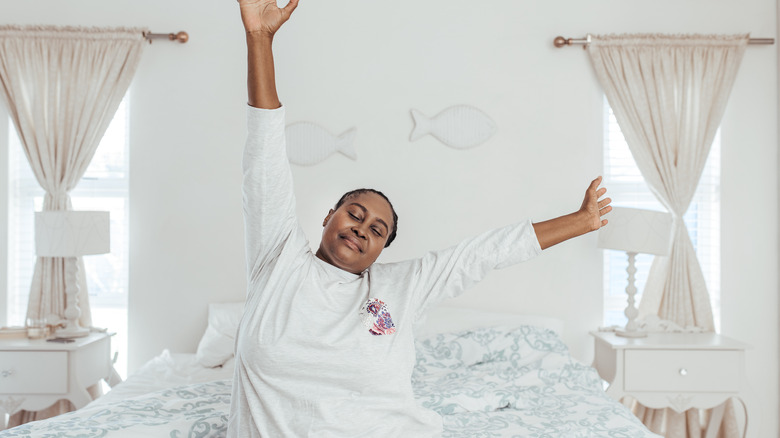
mavo/Shutterstock
“The body and mind tend to give many signs that we are not well-rested and need to implement better bedtime routines,” Dr. Kogan states. Such signs include frequent illness, increased hunger, and daytime fatigue. Mood changes can also be an indicator of sleep issues. “Poor sleep often results in increased irritability, higher stress, anxiety, and other mood changes,” she states. “Those who sleep poorly are also likely to experience poor emotional regulation, with over reactivity to various things that might not normally upset them.”
Another sign of lack of sleep is difficulty maintaining attention. “When we don’t sleep well, we are more inattentive, unfocused, and less productive. Due to inattention, we are less likely to remember information. Because sleep is related to memory consolidation, poor sleep can make it difficult to convert new information into long-term storage,” Dr. Kogan states.
In the event that you find yourself experiencing any of these sleep-related symptoms, Dr. Kogan encourages individuals to do a check in with themselves to evaluate their quality and quantity of sleep.
Find out more about Dr. Julia Kogan online at drjuliakogan.com, follow her on Instagram @drjuliakogan, or connect with her via Linkedin.


